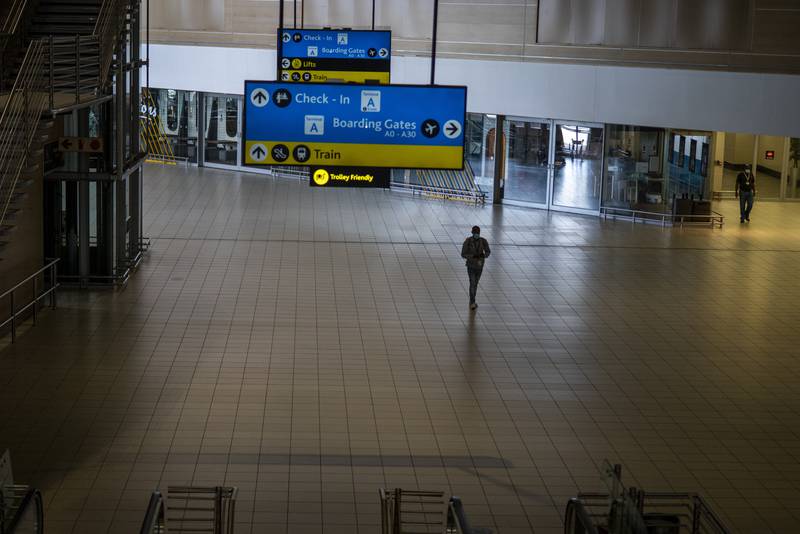Omicron threatens the fragile recovery of Africa’s aviation sector

As African airlines pick up the pieces after almost two years of travel restrictions, another coronavirus variant threatens the fragile recovery of the continent’s aviation sector.
The announcement by South African scientists of the isolation of a variant named Omicron resulted in gates being pulled down on the country’s air access around the world.
The UK was among the first to halt flights to and from South Africa, but others including Gulf airlines such as Etihad Airways and Emirates, the US and China followed.
The country’s state-owned airline, South African Airways (SAA), which went into bankruptcy in the year before the pandemic, was relaunched in September.
SAA has yet to resume its long-haul international routes, but has spent the past three months rebuilding its local flights such as the Johannesburg-Cape Town route. It is also working out a deal to sell a 51 per cent stake in the airline to a private equity partner. “This is probably a further, enormous setback for the recovery of SAA,” said aviation analyst Guy Leitch.
The airline’s position would become more precarious if local travel was shut down, as happened in earlier Covid-related lockdowns. “There’s a very real fear that this will include inter-border travel as well, which would be extremely costly to the economy,” Mr Leitch said.
The latest round of travel restrictions fell heavily on African airlines, he added. “The subtext is that Africa is being picked on because of this issue.”
Elsewhere in Africa, airlines are less affected, but are concerned that if the latest variant appears farther north then they, too, will be shut out of the global aviation network. Caught up in the travel restrictions are seven of South Africa’s neighbours, including Zimbabwe, Botswana and Namibia.
Cyril Ramaphosa, President of South Africa, condemned the closures in a televised address on Sunday evening and called for them to be lifted.
“These restrictions are unjustified and unfairly discriminate against our country and our southern African sister countries,” he said. “The prohibition of travel is not informed by science, nor will it be effective in preventing the spread of this variant.”
Air travel had contributed significantly to the fight against the coronavirus over the past two years, Eric Ntagengerwa, senior policy officer for Air Transport at the African Union (AU), said.
“Airlines played roles in helping [to] manage the pandemic, by distributing medicine and health care experts, making sure countries were getting testing kits.”
Where overland travel is hampered by poor roads, bridges and a general lack of infrastructure, goods and people are moved by air if possible.
World Health Organisation scientists, for instance, were ferried between African capitals to help their counterparts prepare for the virus.
As far back as March 2020, the AU had begun working with airlines to ensure a network of flights kept the anti-pandemic battle operating across the continent, Mr Ntagengerwa said. Even with the current setback, the AU and the African aviation sector would continue efforts to keep the logistical bridge between countries open. “Collaboration between airlines is still key, to see how all member states receive vaccines and revive the industry,” he said.
The latest uncertainty came right as the industry struggled to become competitive against international peers that were moving into Africa, said Gaoussou Konate, director of technical and operations at the African Airlines Association.
“Africa is the size of Europe, China and the US combined, so this makes air transport the most suitable mode of travel.” Yet, the market share of the African aviation market in African hands has fallen from 45 per cent in the 1980s to less than 20 per cent now, Mr Konate said.
Africa is set to become one of the fastest-growing regions for aviation in the next 20 years, with annual expansion of nearly 5 per cent, according to the International Air Transport Association.
US aircraft manufacturer Boeing said recently it valued Africa’s aircraft market at $400 billion, and by 2040, more than 1,000 new aircraft worth $160bn would be needed. Yet, it is by no means certain that African airlines will be part of this growth and that much of it will go to competitors elsewhere.
High landing fees, taxes and other financial hurdles made African airlines costlier to operate than many international counterparts, Mr Konate said.
“Clearly, aviation is not competitive in Africa. The entire continental air transport business is only 2 per cent of the whole global air travel market.”
